
ExtractThinker
ExtractThinker is a Document Intelligence library for LLMs, offering ORM-style interaction for flexible and powerful document workflows.
Stars: 1145
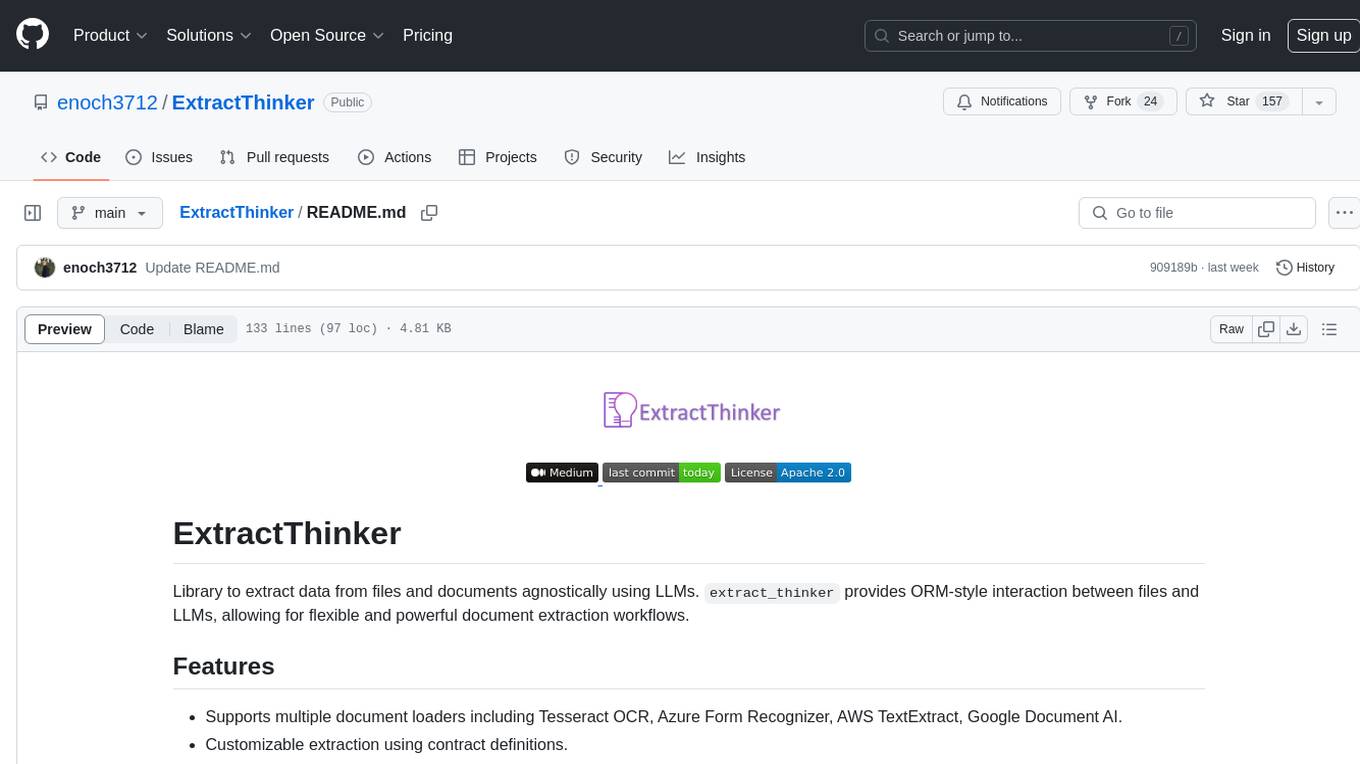
ExtractThinker is a library designed for extracting data from files and documents using Language Model Models (LLMs). It offers ORM-style interaction between files and LLMs, supporting multiple document loaders such as Tesseract OCR, Azure Form Recognizer, AWS TextExtract, and Google Document AI. Users can customize extraction using contract definitions, process documents asynchronously, handle various document formats efficiently, and split and process documents. The project is inspired by the LangChain ecosystem and focuses on Intelligent Document Processing (IDP) using LLMs to achieve high accuracy in document extraction tasks.
README:
ExtractThinker is a flexible document intelligence tool that leverages Large Language Models (LLMs) to extract and classify structured data from documents, functioning like an ORM for seamless document processing workflows.
TL;DR Document Intelligence for LLMs
- Flexible Document Loaders: Support for multiple document loaders, including Tesseract OCR, Azure Form Recognizer, AWS Textract, Google Document AI, and more.
- Customizable Contracts: Define custom extraction contracts using Pydantic models for precise data extraction.
- Advanced Classification: Classify documents or document sections using custom classifications and strategies.
- Asynchronous Processing: Utilize asynchronous processing for efficient handling of large documents.
- Multi-format Support: Seamlessly work with various document formats like PDFs, images, spreadsheets, and more.
- ORM-style Interaction: Interact with documents and LLMs in an ORM-like fashion for intuitive development.
- Splitting Strategies: Implement lazy or eager splitting strategies to process documents page by page or as a whole.
- Integration with LLMs: Easily integrate with different LLM providers like OpenAI, Anthropic, Cohere, and more.
-
Community-driven Development: Inspired by the LangChain ecosystem with a focus on intelligent document processing.
Install ExtractThinker using pip:
pip install extract_thinkerHere's a quick example to get you started with ExtractThinker. This example demonstrates how to load a document using PyPdf and extract specific fields defined in a contract.
import os
from dotenv import load_dotenv
from extract_thinker import Extractor, DocumentLoaderPyPdf, Contract
load_dotenv()
class InvoiceContract(Contract):
invoice_number: str
invoice_date: str
# Set the path to your Tesseract executable
test_file_path = os.path.join("path_to_your_files", "invoice.pdf")
# Initialize the extractor
extractor = Extractor()
extractor.load_document_loader(DocumentLoaderPyPdf())
extractor.load_llm("gpt-4o-mini") # or any other supported model
# Extract data from the document
result = extractor.extract(test_file_path, InvoiceContract)
print("Invoice Number:", result.invoice_number)
print("Invoice Date:", result.invoice_date)ExtractThinker allows you to classify documents or parts of documents using custom classifications:
import os
from dotenv import load_dotenv
from extract_thinker import (
Extractor, Classification, Process, ClassificationStrategy,
DocumentLoaderPyPdf, Contract
)
load_dotenv()
class InvoiceContract(Contract):
invoice_number: str
invoice_date: str
class DriverLicenseContract(Contract):
name: str
license_number: str
# Initialize the extractor and load the document loader
extractor = Extractor()
extractor.load_document_loader(DocumentLoaderPyPdf())
extractor.load_llm("gpt-4o-mini")
# Define classifications
classifications = [
Classification(
name="Invoice",
description="An invoice document",
contract=InvoiceContract,
extractor=extractor,
),
Classification(
name="Driver License",
description="A driver's license document",
contract=DriverLicenseContract,
extractor=extractor,
),
]
# Classify the document directly using the extractor
result = extractor.classify(
"path_to_your_document.pdf", # Can be a file path or IO stream
classifications,
image=True # Set to True for image-based classification
)
# The result will be a ClassificationResponse object with 'name' and 'confidence' fields
print(f"Document classified as: {result.name}")
print(f"Confidence level: {result.confidence}")ExtractThinker allows you to split and process documents using different strategies. Here's how you can split a document and extract data based on classifications.
import os
from dotenv import load_dotenv
from extract_thinker import (
Extractor,
Process,
Classification,
ImageSplitter,
DocumentLoaderTesseract,
Contract,
SplittingStrategy,
)
load_dotenv()
class DriverLicenseContract(Contract):
name: str
license_number: str
class InvoiceContract(Contract):
invoice_number: str
invoice_date: str
# Initialize the extractor and load the document loader
extractor = Extractor()
extractor.load_document_loader(DocumentLoaderPyPdf())
extractor.load_llm("gpt-4o-mini")
# Define classifications
classifications = [
Classification(
name="Driver License",
description="A driver's license document",
contract=DriverLicenseContract,
extractor=extractor,
),
Classification(
name="Invoice",
description="An invoice document",
contract=InvoiceContract,
extractor=extractor,
),
]
# Initialize the process and load the splitter
process = Process()
process.load_document_loader(DocumentLoaderPyPdf())
process.load_splitter(ImageSplitter(model="gpt-4o-mini"))
# Load and process the document
path_to_document = "path_to_your_multipage_document.pdf"
split_content = (
process.load_file(path_to_document)
.split(classifications, strategy=SplittingStrategy.LAZY)
.extract()
)
# Process the extracted content as needed
for item in split_content:
if isinstance(item, InvoiceContract):
print("Extracted Invoice:")
print("Invoice Number:", item.invoice_number)
print("Invoice Date:", item.invoice_date)
elif isinstance(item, DriverLicenseContract):
print("Extracted Driver License:")
print("Name:", item.name)
print("License Number:", item.license_number)You can also perform batch processing of documents:
from extract_thinker import Extractor, Contract
class ReceiptContract(Contract):
store_name: str
total_amount: float
extractor = Extractor()
extractor.load_llm("gpt-4o-mini")
# List of file paths or streams
document = "receipt1.jpg"
batch_job = extractor.extract_batch(
source=document,
response_model=ReceiptContract,
vision=True,
)
# Monitor the batch job status
print("Batch Job Status:", await batch_job.get_status())
# Retrieve results once processing is complete
results = await batch_job.get_result()
for result in results.parsed_results:
print("Store Name:", result.store_name)
print("Total Amount:", result.total_amount)ExtractThinker supports custom LLM integrations. Here's how you can use a custom LLM:
from extract_thinker import Extractor, LLM, DocumentLoaderTesseract, Contract
class InvoiceContract(Contract):
invoice_number: str
invoice_date: str
# Initialize the extractor
extractor = Extractor()
extractor.load_document_loader(DocumentLoaderTesseract(os.getenv("TESSERACT_PATH")))
# Load a custom LLM (e.g., Ollama)
llm = LLM('ollama/phi3', api_base='http://localhost:11434')
extractor.load_llm(llm)
# Extract data
result = extractor.extract("invoice.png", InvoiceContract)
print("Invoice Number:", result.invoice_number)
print("Invoice Date:", result.invoice_date)- Examples: Check out the examples directory for Jupyter notebooks and scripts demonstrating various use cases.
- Medium Articles: Read articles about ExtractThinker on the author's Medium page.
- Test Suite: Explore the test suite in the tests/ directory for more advanced usage examples and test cases.
ExtractThinker supports integration with multiple LLM providers:
- OpenAI: Use models like gpt-3.5-turbo, gpt-4, etc.
- Anthropic: Integrate with Claude models.
- Cohere: Utilize Cohere's language models.
- Azure OpenAI: Connect with Azure's OpenAI services.
- Local Models: Ollama compatible models.
ExtractThinker uses a modular architecture inspired by the LangChain ecosystem:
- Document Loaders: Responsible for loading and preprocessing documents from various sources and formats.
- Extractors: Orchestrate the interaction between the document loaders and LLMs to extract structured data.
- Splitters: Implement strategies to split documents into manageable chunks for processing.
- Contracts: Define the expected structure of the extracted data using Pydantic models.
- Classifications: Classify documents or document sections to apply appropriate extraction contracts.
- Processes: Manage the workflow of loading, classifying, splitting, and extracting data from documents.
While general frameworks like LangChain offer a broad range of functionalities, ExtractThinker is specialized for Intelligent Document Processing (IDP). It simplifies the complexities associated with IDP by providing:
- Specialized Components: Tailored tools for document loading, splitting, and extraction.
- High Accuracy with LLMs: Leverages the power of LLMs to improve the accuracy of data extraction and classification.
- Ease of Use: Intuitive APIs and ORM-style interactions reduce the learning curve.
- Community Support: Active development and support from the community.
We welcome contributions from the community! To contribute:
- Fork the repository
- Create a new branch for your feature or bugfix
- Write tests for your changes
- Run tests to ensure everything is working correctly
- Submit a pull request with a description of your changes
Stay updated and connect with the community:
- Scaling Document Extraction with o1, GPT-4o & Mini
- Claude 3.5 — The King of Document Intelligence
- Classification Tree for LLMs
- Advanced Document Classification with LLMs
- Phi-3 and Azure: PDF Data Extraction | ExtractThinker
- ExtractThinker: Document Intelligence for LLMs
This project is licensed under the Apache License 2.0. See the LICENSE file for more details.
For any questions or issues, please open an issue on the GitHub repository or reach out via email.
For Tasks:
Click tags to check more tools for each tasksFor Jobs:
Alternative AI tools for ExtractThinker
Similar Open Source Tools

ExtractThinker
ExtractThinker is a library designed for extracting data from files and documents using Language Model Models (LLMs). It offers ORM-style interaction between files and LLMs, supporting multiple document loaders such as Tesseract OCR, Azure Form Recognizer, AWS TextExtract, and Google Document AI. Users can customize extraction using contract definitions, process documents asynchronously, handle various document formats efficiently, and split and process documents. The project is inspired by the LangChain ecosystem and focuses on Intelligent Document Processing (IDP) using LLMs to achieve high accuracy in document extraction tasks.
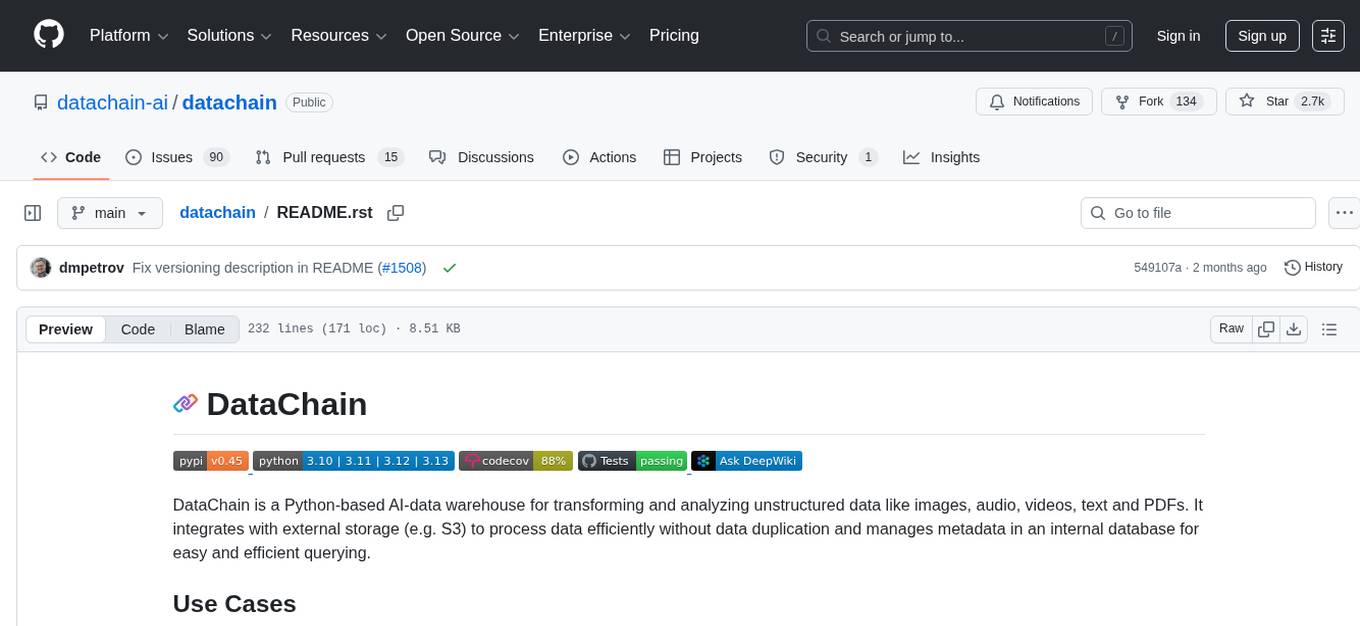
datachain
DataChain is a Python-based AI-data warehouse for transforming and analyzing unstructured data like images, audio, videos, text, and PDFs. It integrates with external storage to process data efficiently without duplication and manages metadata for easy querying. Use cases include ETL, analytics, versioning, and incremental processing. Key features include multimodal dataset versioning, Python-friendly operations, data enrichment, and processing. The tool allows for generating metadata using AI models, filtering, joining, and grouping datasets, and performing high-performance vectorized operations.
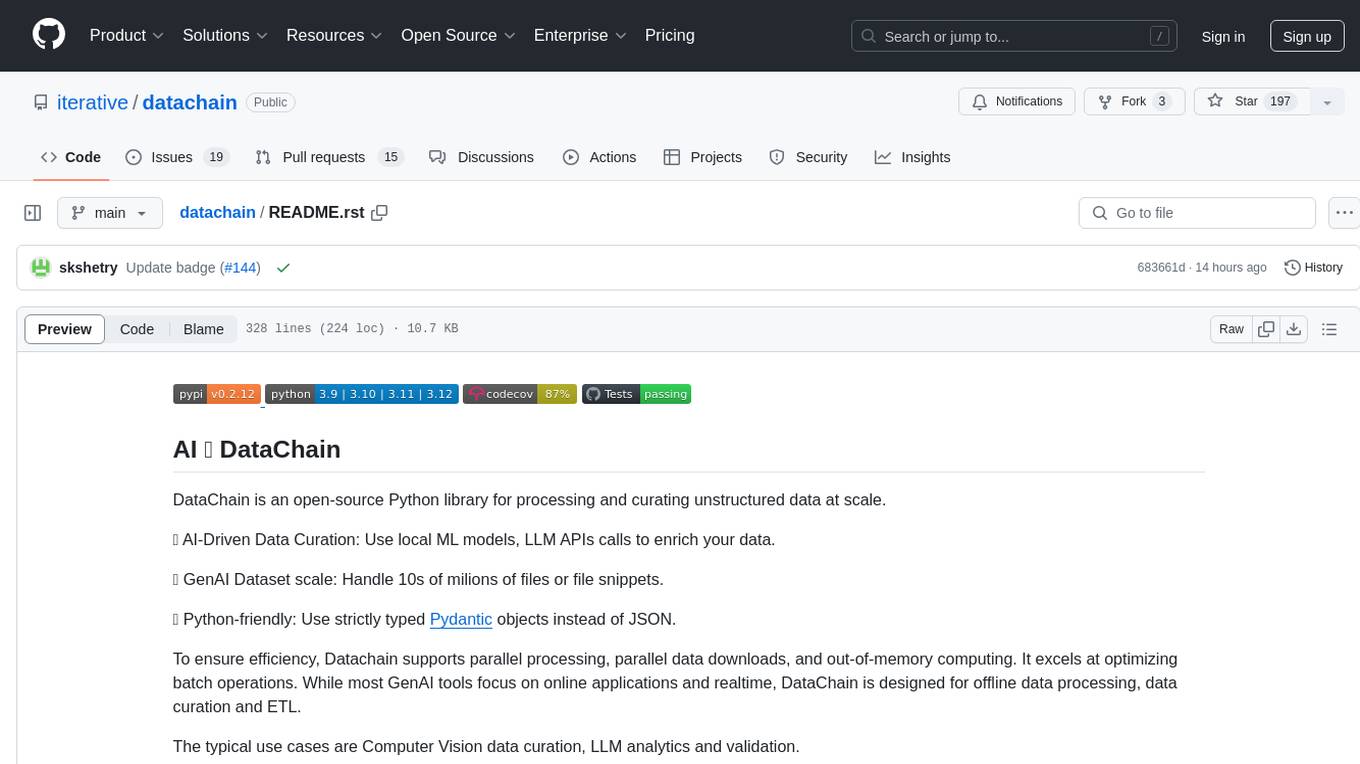
datachain
DataChain is an open-source Python library for processing and curating unstructured data at scale. It supports AI-driven data curation using local ML models and LLM APIs, handles large datasets, and is Python-friendly with Pydantic objects. It excels at optimizing batch operations and is designed for offline data processing, curation, and ETL. Typical use cases include Computer Vision data curation, LLM analytics, and validation.
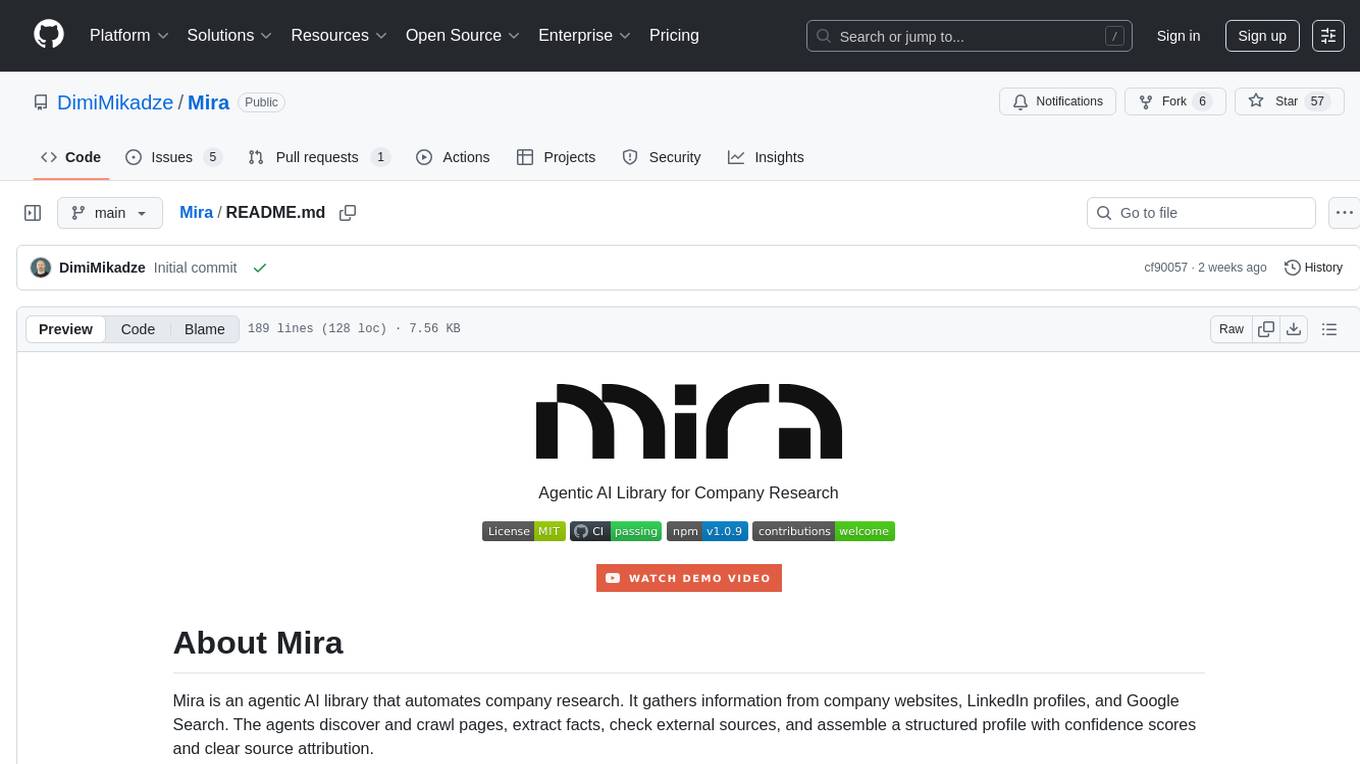
Mira
Mira is an agentic AI library designed for automating company research by gathering information from various sources like company websites, LinkedIn profiles, and Google Search. It utilizes a multi-agent architecture to collect and merge data points into a structured profile with confidence scores and clear source attribution. The core library is framework-agnostic and can be integrated into applications, pipelines, or custom workflows. Mira offers features such as real-time progress events, confidence scoring, company criteria matching, and built-in services for data gathering. The tool is suitable for users looking to streamline company research processes and enhance data collection efficiency.
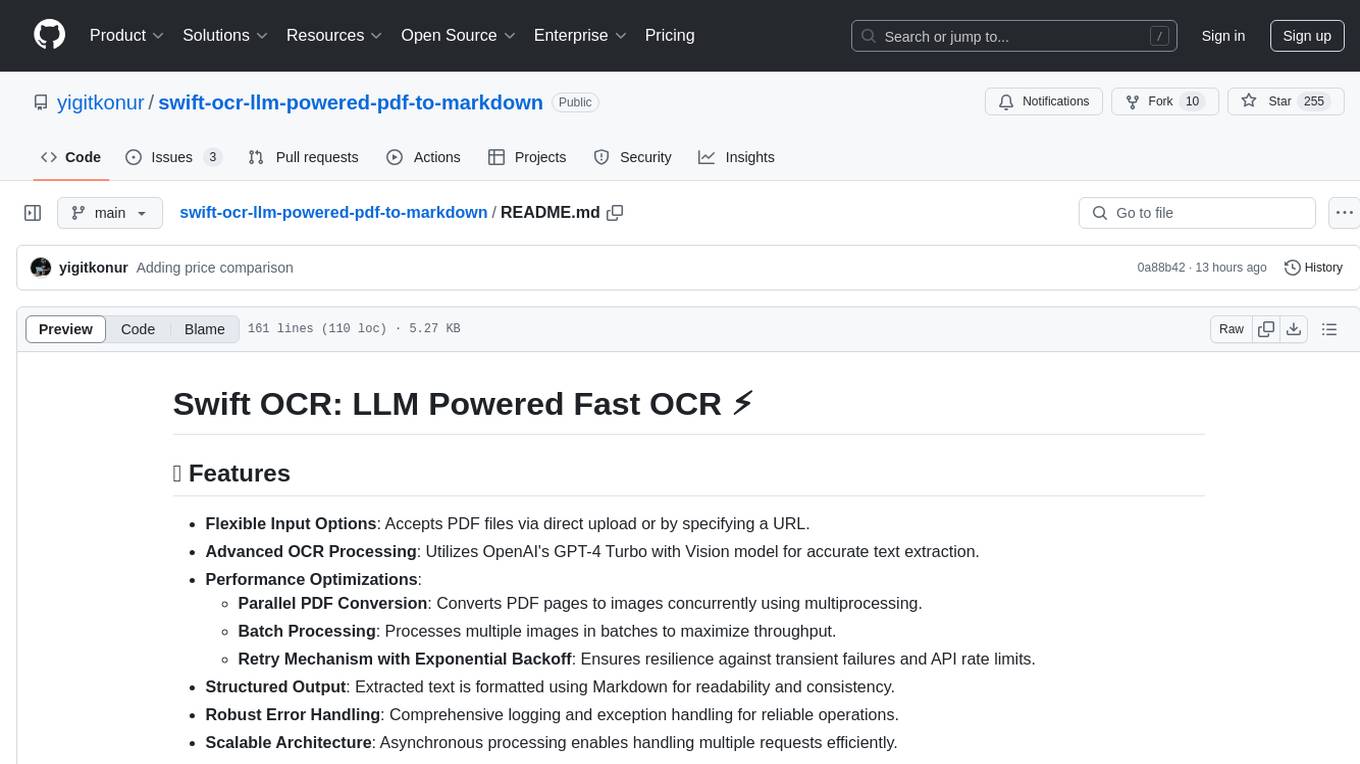
swift-ocr-llm-powered-pdf-to-markdown
Swift OCR is a powerful tool for extracting text from PDF files using OpenAI's GPT-4 Turbo with Vision model. It offers flexible input options, advanced OCR processing, performance optimizations, structured output, robust error handling, and scalable architecture. The tool ensures accurate text extraction, resilience against failures, and efficient handling of multiple requests.

rl
TorchRL is an open-source Reinforcement Learning (RL) library for PyTorch. It provides pytorch and **python-first** , low and high level abstractions for RL that are intended to be **efficient** , **modular** , **documented** and properly **tested**. The code is aimed at supporting research in RL. Most of it is written in python in a highly modular way, such that researchers can easily swap components, transform them or write new ones with little effort.
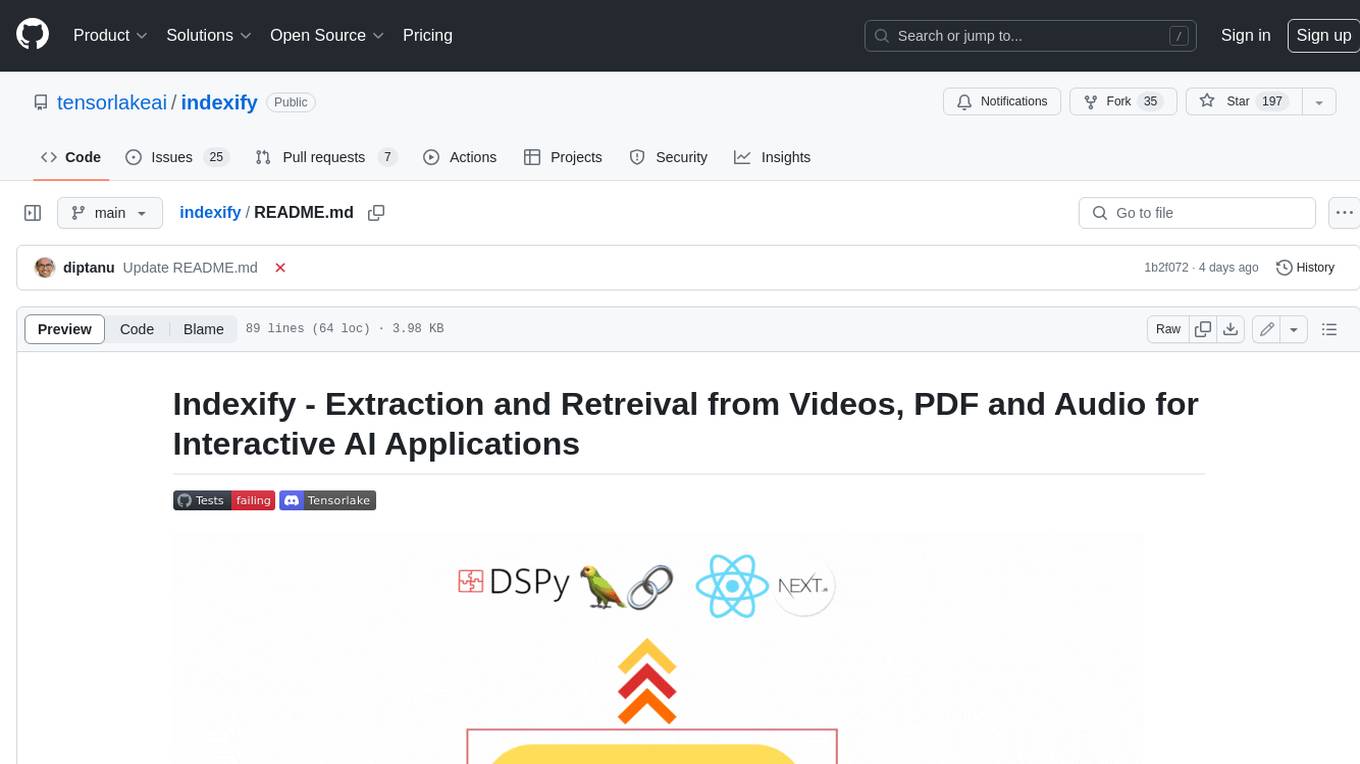
indexify
Indexify is an open-source engine for building fast data pipelines for unstructured data (video, audio, images, and documents) using reusable extractors for embedding, transformation, and feature extraction. LLM Applications can query transformed content friendly to LLMs by semantic search and SQL queries. Indexify keeps vector databases and structured databases (PostgreSQL) updated by automatically invoking the pipelines as new data is ingested into the system from external data sources. **Why use Indexify** * Makes Unstructured Data **Queryable** with **SQL** and **Semantic Search** * **Real-Time** Extraction Engine to keep indexes **automatically** updated as new data is ingested. * Create **Extraction Graph** to describe **data transformation** and extraction of **embedding** and **structured extraction**. * **Incremental Extraction** and **Selective Deletion** when content is deleted or updated. * **Extractor SDK** allows adding new extraction capabilities, and many readily available extractors for **PDF**, **Image**, and **Video** indexing and extraction. * Works with **any LLM Framework** including **Langchain**, **DSPy**, etc. * Runs on your laptop during **prototyping** and also scales to **1000s of machines** on the cloud. * Works with many **Blob Stores**, **Vector Stores**, and **Structured Databases** * We have even **Open Sourced Automation** to deploy to Kubernetes in production.
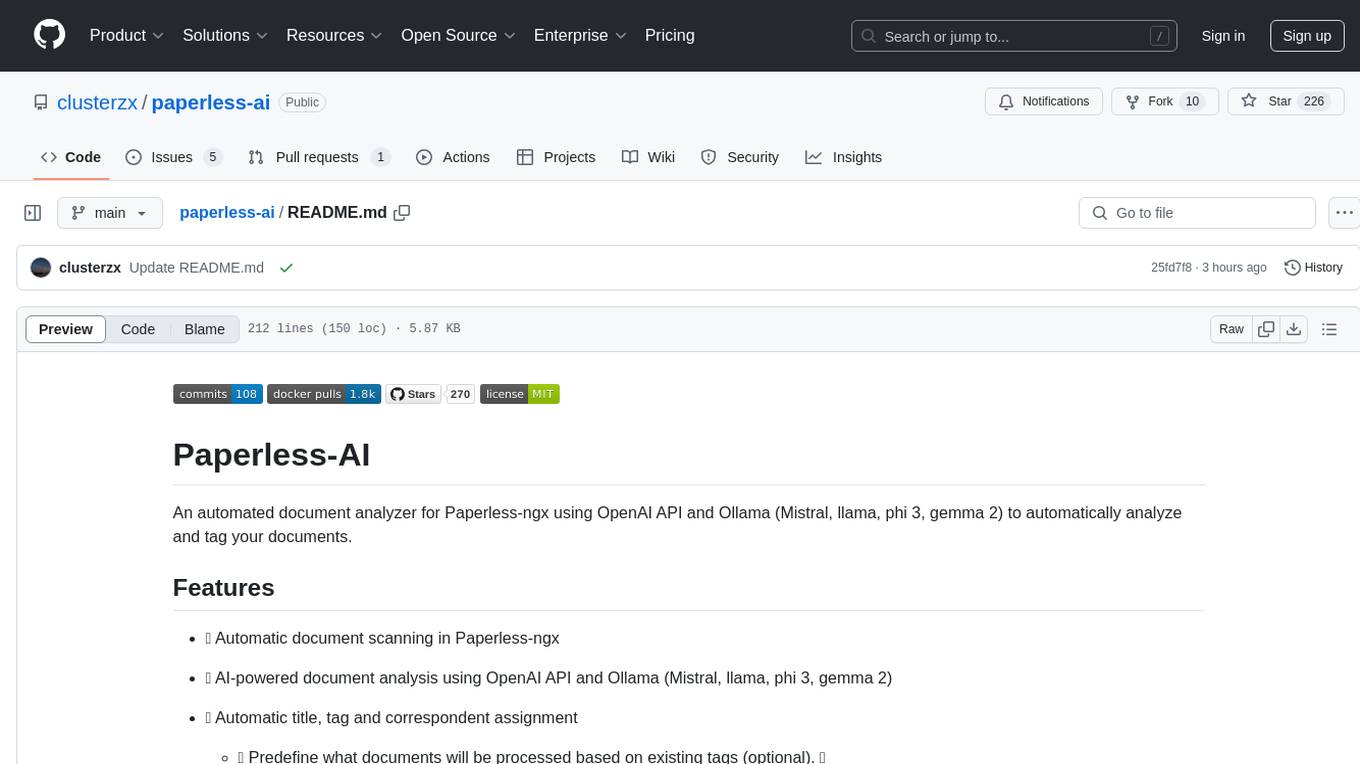
paperless-ai
Paperless-AI is an automated document analyzer tool designed for Paperless-ngx users. It utilizes the OpenAI API and Ollama (Mistral, llama, phi 3, gemma 2) to automatically scan, analyze, and tag documents. The tool offers features such as automatic document scanning, AI-powered document analysis, automatic title and tag assignment, manual mode for analyzing documents, easy setup through a web interface, document processing dashboard, error handling, and Docker support. Users can configure the tool through a web interface and access a debug interface for monitoring and troubleshooting. Paperless-AI aims to streamline document organization and analysis processes for users with access to Paperless-ngx and AI capabilities.
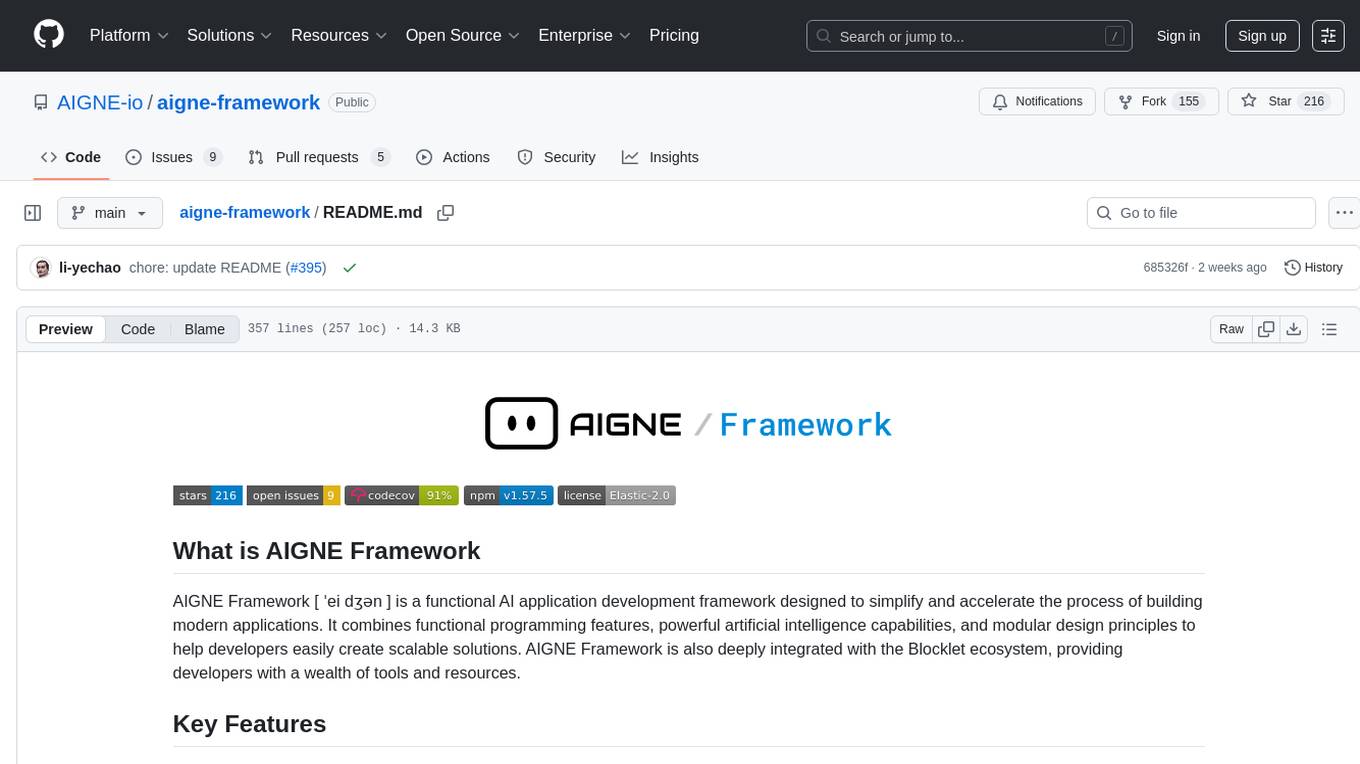
aigne-framework
AIGNE Framework is a functional AI application development framework designed to simplify and accelerate the process of building modern applications. It combines functional programming features, powerful artificial intelligence capabilities, and modular design principles to help developers easily create scalable solutions. With key features like modular design, TypeScript support, multiple AI model support, flexible workflow patterns, MCP protocol integration, code execution capabilities, and Blocklet ecosystem integration, AIGNE Framework offers a comprehensive solution for developers. The framework provides various workflow patterns such as Workflow Router, Workflow Sequential, Workflow Concurrency, Workflow Handoff, Workflow Reflection, Workflow Orchestration, Workflow Code Execution, and Workflow Group Chat to address different application scenarios efficiently. It also includes built-in MCP support for running MCP servers and integrating with external MCP servers, along with packages for core functionality, agent library, CLI, and various models like OpenAI, Gemini, Claude, and Nova.
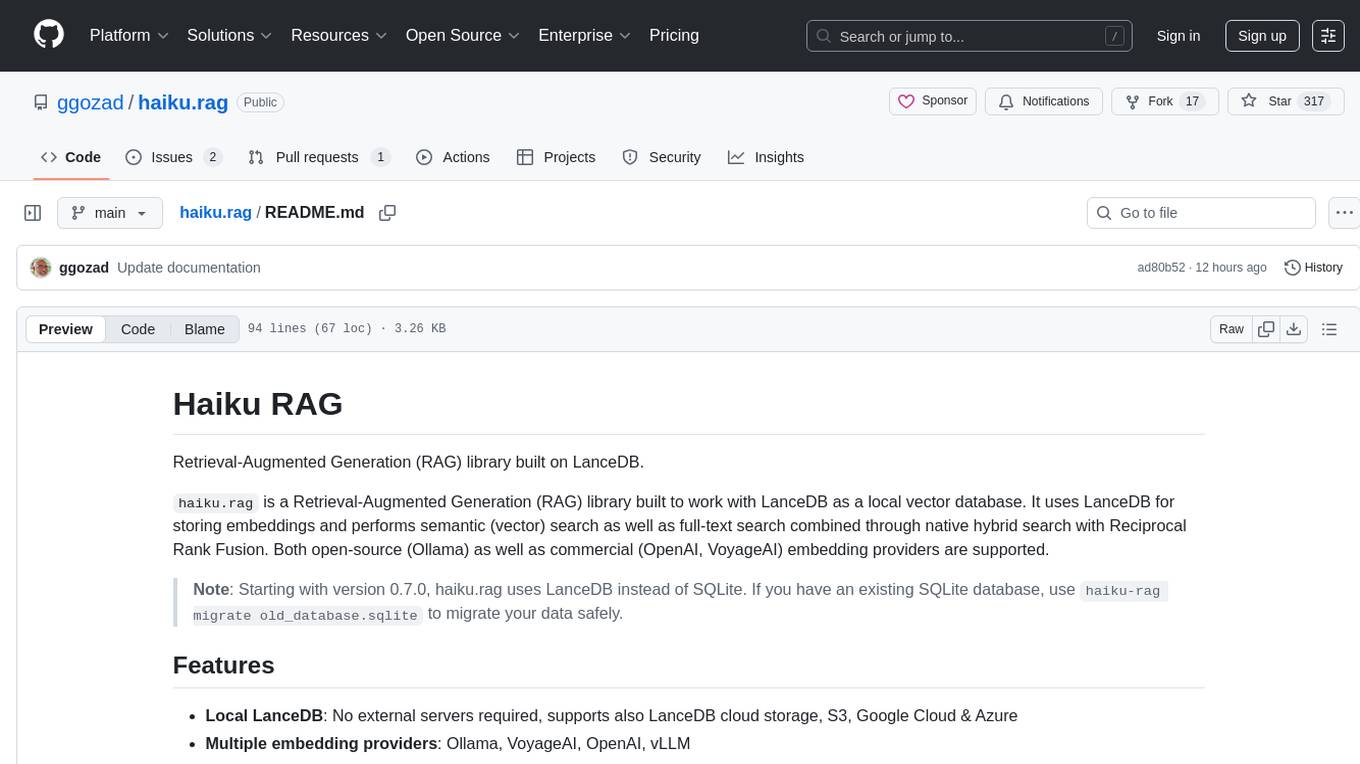
haiku.rag
Haiku RAG is a Retrieval-Augmented Generation (RAG) library that utilizes LanceDB as a local vector database. It supports semantic and full-text search, hybrid search with Reciprocal Rank Fusion, multiple embedding and QA providers, default search result reranking, question answering, file monitoring, and various file formats. It can be used via CLI or Python API, and can serve as tools for AI assistants like Claude Desktop. The library offers features for document management and search, with detailed documentation available.
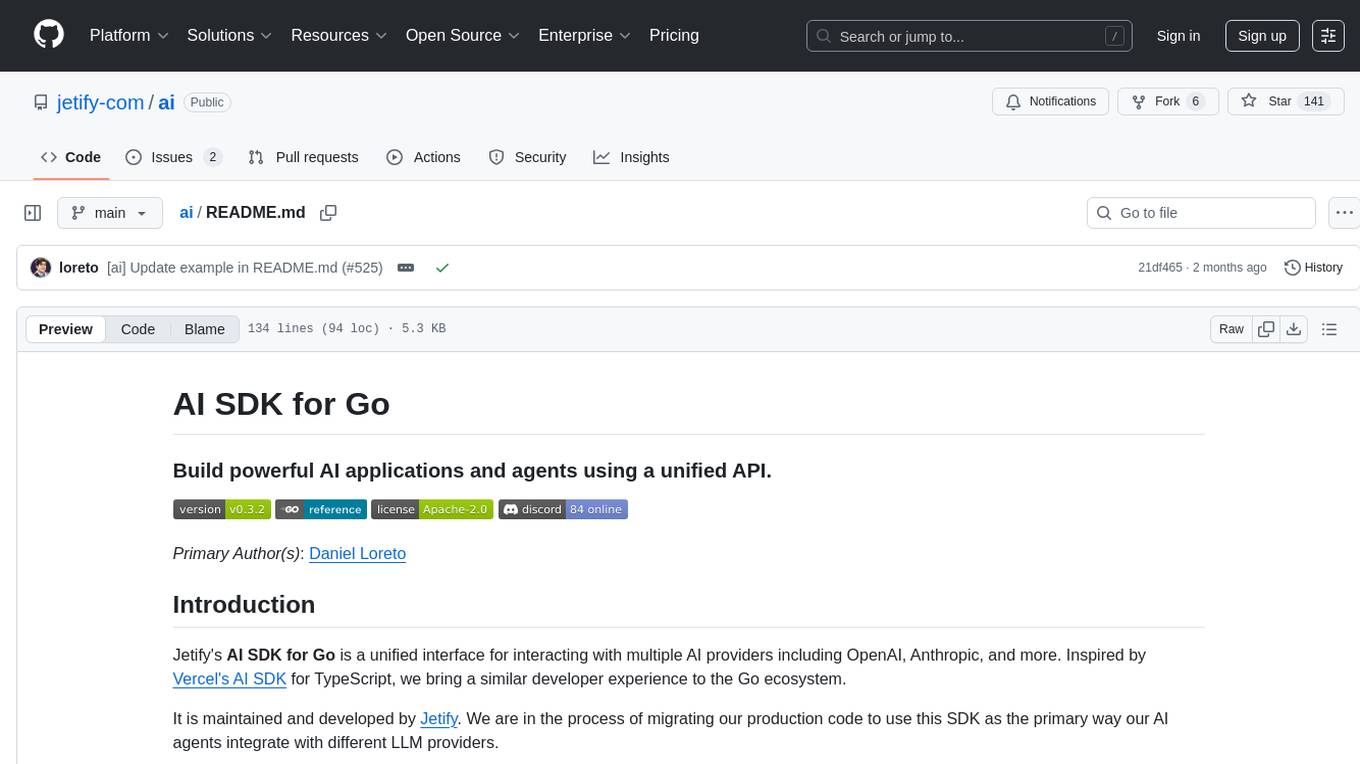
ai
Jetify's AI SDK for Go is a unified interface for interacting with multiple AI providers including OpenAI, Anthropic, and more. It addresses the challenges of fragmented ecosystems, vendor lock-in, poor Go developer experience, and complex multi-modal handling by providing a unified interface, Go-first design, production-ready features, multi-modal support, and extensible architecture. The SDK supports language models, embeddings, image generation, multi-provider support, multi-modal inputs, tool calling, and structured outputs.

crawl4ai
Crawl4AI is a powerful and free web crawling service that extracts valuable data from websites and provides LLM-friendly output formats. It supports crawling multiple URLs simultaneously, replaces media tags with ALT, and is completely free to use and open-source. Users can integrate Crawl4AI into Python projects as a library or run it as a standalone local server. The tool allows users to crawl and extract data from specified URLs using different providers and models, with options to include raw HTML content, force fresh crawls, and extract meaningful text blocks. Configuration settings can be adjusted in the `crawler/config.py` file to customize providers, API keys, chunk processing, and word thresholds. Contributions to Crawl4AI are welcome from the open-source community to enhance its value for AI enthusiasts and developers.
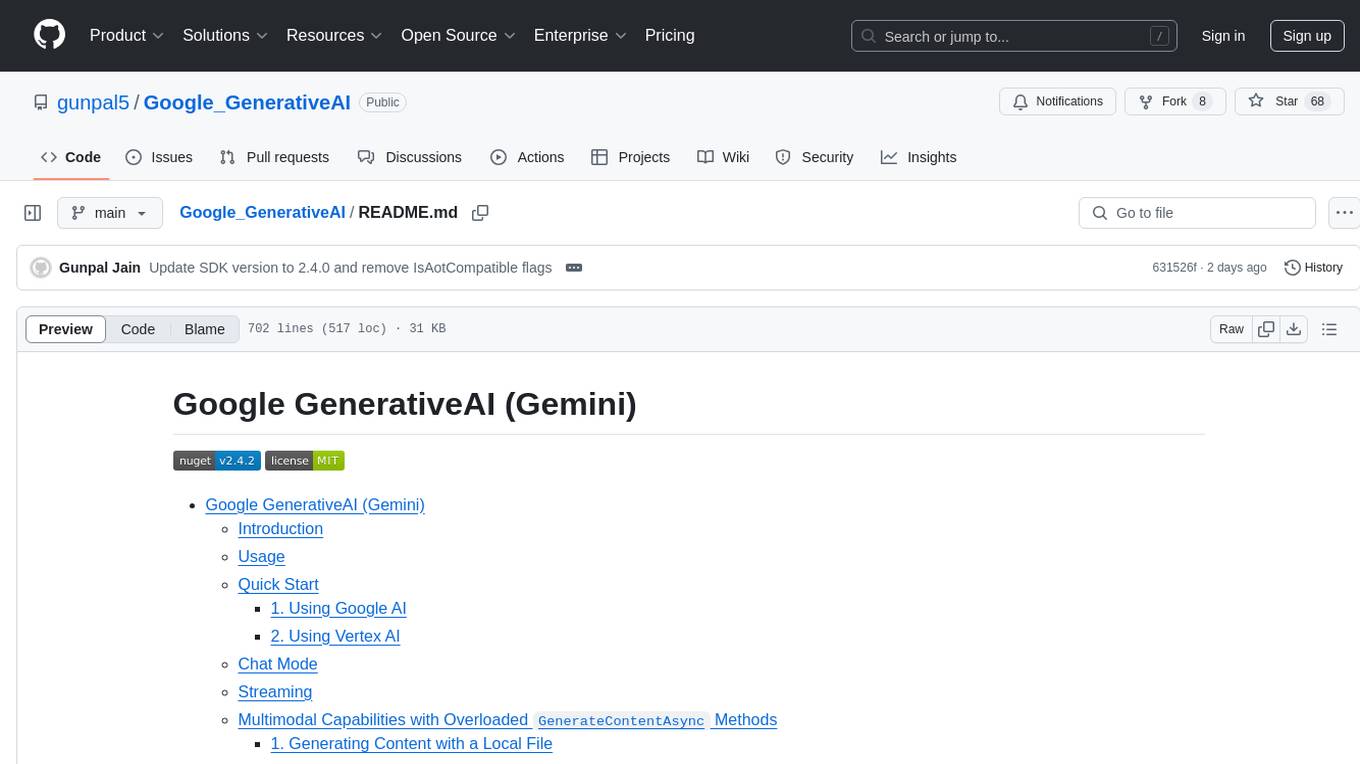
Google_GenerativeAI
Google GenerativeAI (Gemini) is an unofficial C# .Net SDK based on REST APIs for accessing Google Gemini models. It offers a complete rewrite of the previous SDK with improved performance, flexibility, and ease of use. The SDK seamlessly integrates with LangChain.net, providing easy methods for JSON-based interactions and function calling with Google Gemini models. It includes features like enhanced JSON mode handling, function calling with code generator, multi-modal functionality, Vertex AI support, multimodal live API, image generation and captioning, retrieval-augmented generation with Vertex RAG Engine and Google AQA, easy JSON handling, Gemini tools and function calling, multimodal live API, and more.
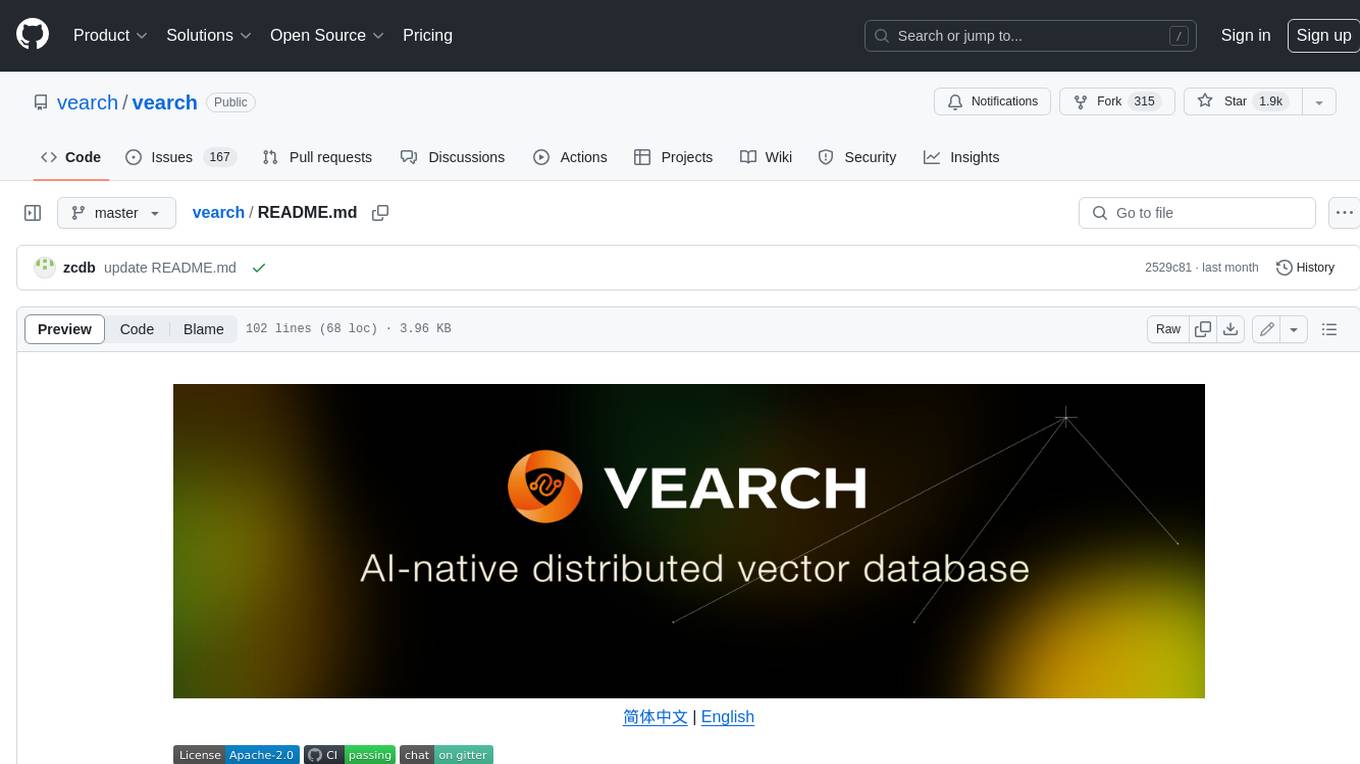
vearch
Vearch is a cloud-native distributed vector database designed for efficient similarity search of embedding vectors in AI applications. It supports hybrid search with vector search and scalar filtering, offers fast vector retrieval from millions of objects in milliseconds, and ensures scalability and reliability through replication and elastic scaling out. Users can deploy Vearch cluster on Kubernetes, add charts from the repository or locally, start with Docker-compose, or compile from source code. The tool includes components like Master for schema management, Router for RESTful API, and PartitionServer for hosting document partitions with raft-based replication. Vearch can be used for building visual search systems for indexing images and offers a Python SDK for easy installation and usage. The tool is suitable for AI developers and researchers looking for efficient vector search capabilities in their applications.
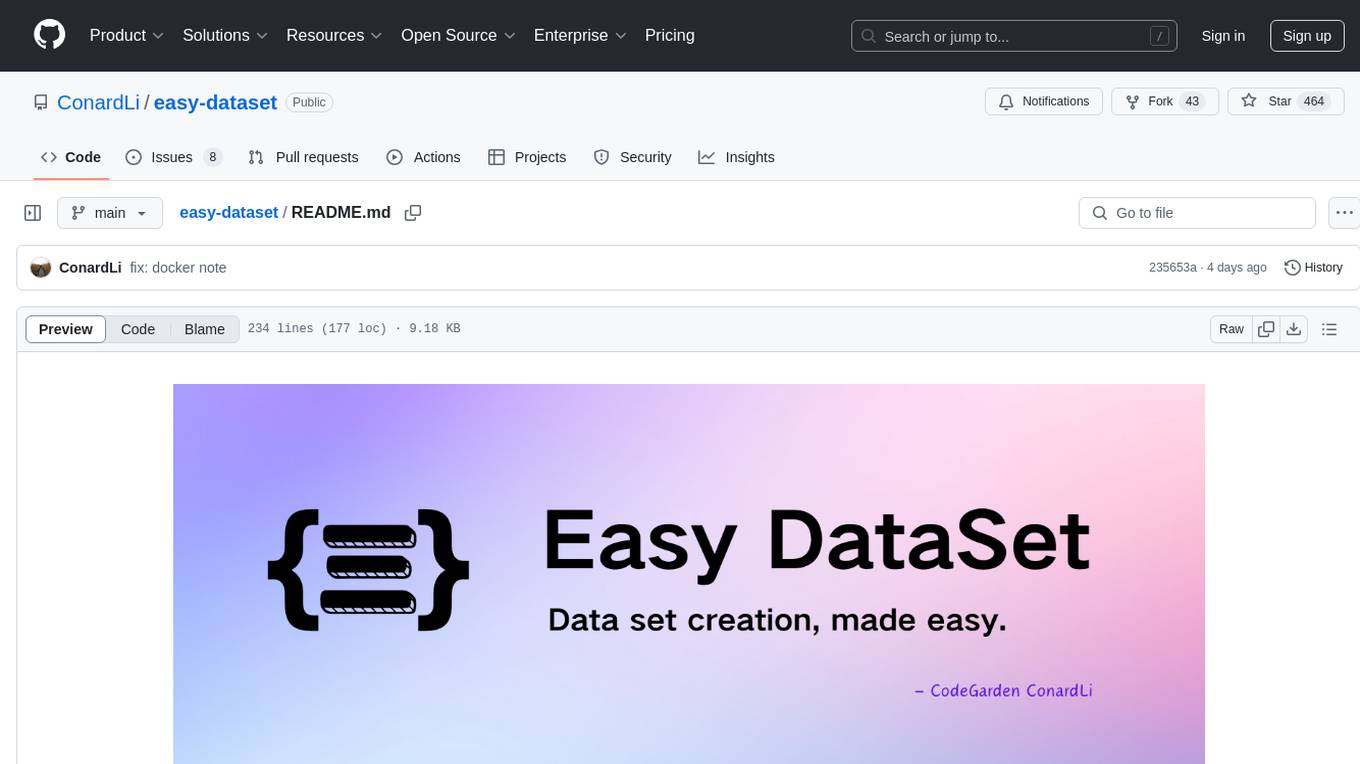
easy-dataset
Easy Dataset is a specialized application designed to streamline the creation of fine-tuning datasets for Large Language Models (LLMs). It offers an intuitive interface for uploading domain-specific files, intelligently splitting content, generating questions, and producing high-quality training data for model fine-tuning. With Easy Dataset, users can transform domain knowledge into structured datasets compatible with all OpenAI-format compatible LLM APIs, making the fine-tuning process accessible and efficient.
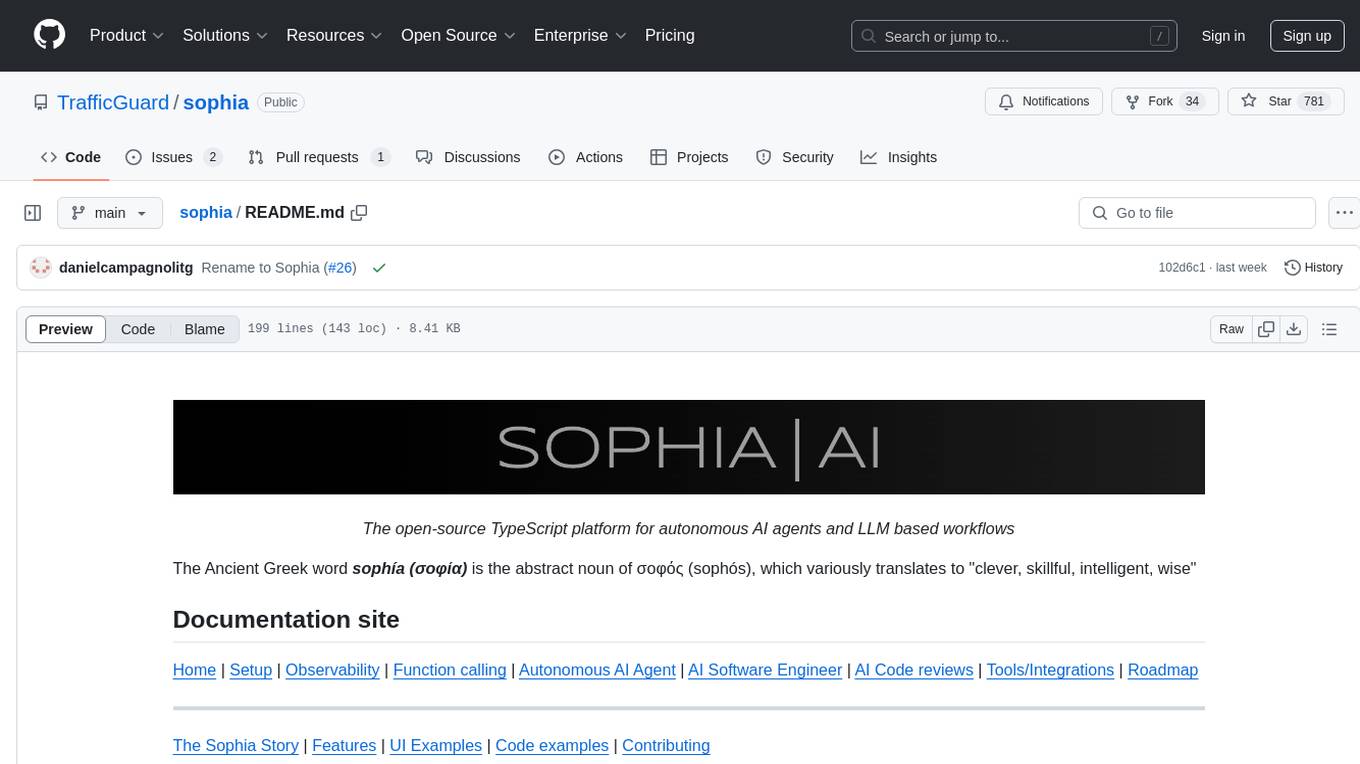
sophia
Sophia is an open-source TypeScript platform designed for autonomous AI agents and LLM based workflows. It aims to automate processes, review code, assist with refactorings, and support various integrations. The platform offers features like advanced autonomous agents, reasoning/planning inspired by Google's Self-Discover paper, memory and function call history, adaptive iterative planning, and more. Sophia supports multiple LLMs/services, CLI and web interface, human-in-the-loop interactions, flexible deployment options, observability with OpenTelemetry tracing, and specific agents for code editing, software engineering, and code review. It provides a flexible platform for the TypeScript community to expand and support various use cases and integrations.
For similar tasks

ExtractThinker
ExtractThinker is a library designed for extracting data from files and documents using Language Model Models (LLMs). It offers ORM-style interaction between files and LLMs, supporting multiple document loaders such as Tesseract OCR, Azure Form Recognizer, AWS TextExtract, and Google Document AI. Users can customize extraction using contract definitions, process documents asynchronously, handle various document formats efficiently, and split and process documents. The project is inspired by the LangChain ecosystem and focuses on Intelligent Document Processing (IDP) using LLMs to achieve high accuracy in document extraction tasks.

skyvern
Skyvern automates browser-based workflows using LLMs and computer vision. It provides a simple API endpoint to fully automate manual workflows, replacing brittle or unreliable automation solutions. Traditional approaches to browser automations required writing custom scripts for websites, often relying on DOM parsing and XPath-based interactions which would break whenever the website layouts changed. Instead of only relying on code-defined XPath interactions, Skyvern adds computer vision and LLMs to the mix to parse items in the viewport in real-time, create a plan for interaction and interact with them. This approach gives us a few advantages: 1. Skyvern can operate on websites it’s never seen before, as it’s able to map visual elements to actions necessary to complete a workflow, without any customized code 2. Skyvern is resistant to website layout changes, as there are no pre-determined XPaths or other selectors our system is looking for while trying to navigate 3. Skyvern leverages LLMs to reason through interactions to ensure we can cover complex situations. Examples include: 1. If you wanted to get an auto insurance quote from Geico, the answer to a common question “Were you eligible to drive at 18?” could be inferred from the driver receiving their license at age 16 2. If you were doing competitor analysis, it’s understanding that an Arnold Palmer 22 oz can at 7/11 is almost definitely the same product as a 23 oz can at Gopuff (even though the sizes are slightly different, which could be a rounding error!) Want to see examples of Skyvern in action? Jump to #real-world-examples-of- skyvern

airbyte-connectors
This repository contains Airbyte connectors used in Faros and Faros Community Edition platforms as well as Airbyte Connector Development Kit (CDK) for JavaScript/TypeScript.

open-parse
Open Parse is a Python library for visually discerning document layouts and chunking them effectively. It is designed to fill the gap in open-source libraries for handling complex documents. Unlike text splitting, which converts a file to raw text and slices it up, Open Parse visually analyzes documents for superior LLM input. It also supports basic markdown for parsing headings, bold, and italics, and has high-precision table support, extracting tables into clean Markdown formats with accuracy that surpasses traditional tools. Open Parse is extensible, allowing users to easily implement their own post-processing steps. It is also intuitive, with great editor support and completion everywhere, making it easy to use and learn.
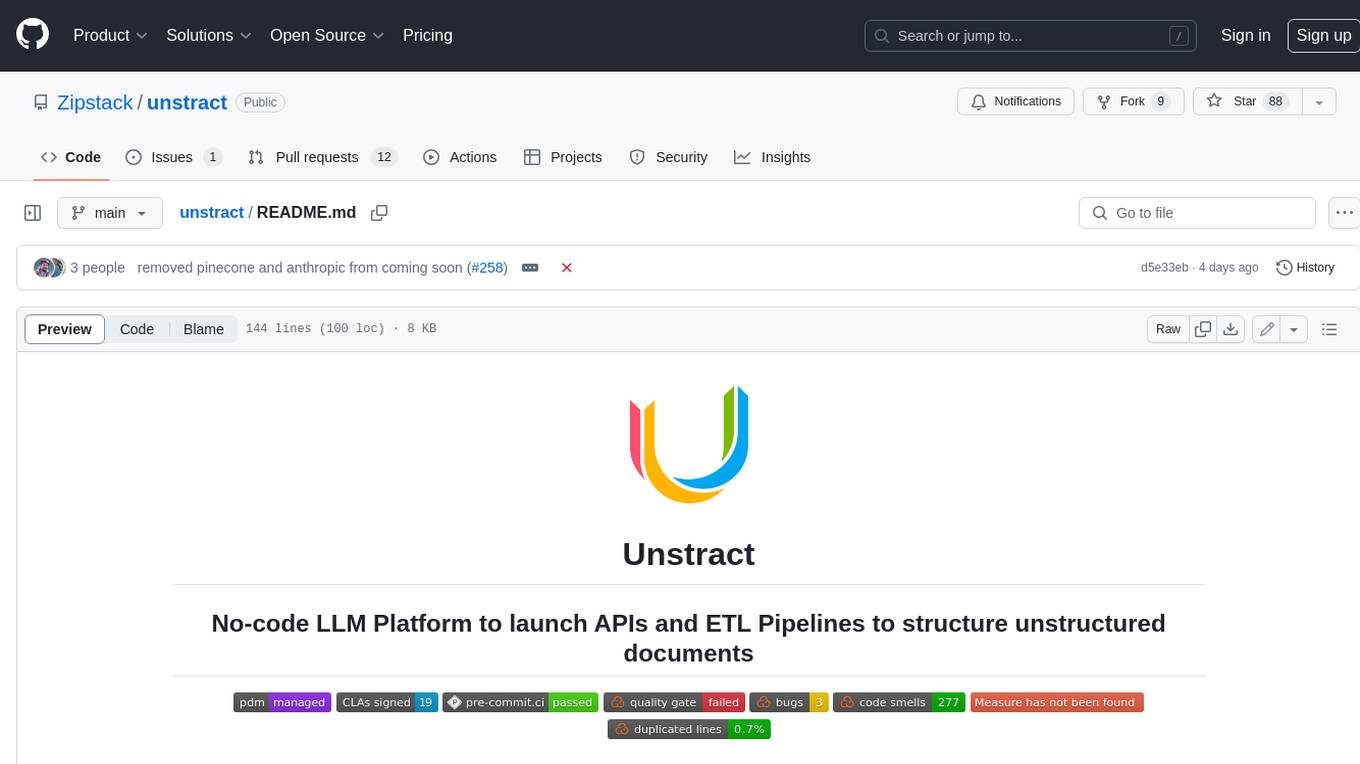
unstract
Unstract is a no-code platform that enables users to launch APIs and ETL pipelines to structure unstructured documents. With Unstract, users can go beyond co-pilots by enabling machine-to-machine automation. Unstract's Prompt Studio provides a simple, no-code approach to creating prompts for LLMs, vector databases, embedding models, and text extractors. Users can then configure Prompt Studio projects as API deployments or ETL pipelines to automate critical business processes that involve complex documents. Unstract supports a wide range of LLM providers, vector databases, embeddings, text extractors, ETL sources, and ETL destinations, providing users with the flexibility to choose the best tools for their needs.
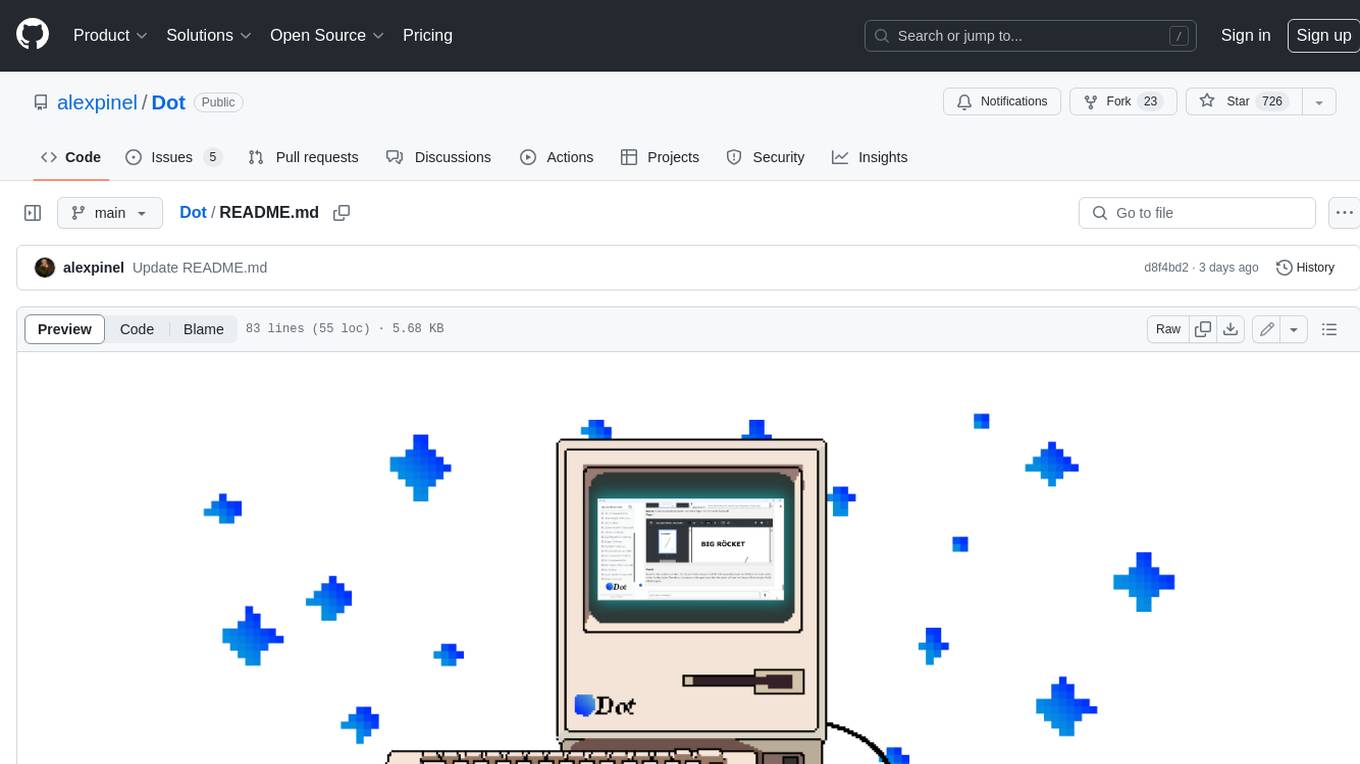
Dot
Dot is a standalone, open-source application designed for seamless interaction with documents and files using local LLMs and Retrieval Augmented Generation (RAG). It is inspired by solutions like Nvidia's Chat with RTX, providing a user-friendly interface for those without a programming background. Pre-packaged with Mistral 7B, Dot ensures accessibility and simplicity right out of the box. Dot allows you to load multiple documents into an LLM and interact with them in a fully local environment. Supported document types include PDF, DOCX, PPTX, XLSX, and Markdown. Users can also engage with Big Dot for inquiries not directly related to their documents, similar to interacting with ChatGPT. Built with Electron JS, Dot encapsulates a comprehensive Python environment that includes all necessary libraries. The application leverages libraries such as FAISS for creating local vector stores, Langchain, llama.cpp & Huggingface for setting up conversation chains, and additional tools for document management and interaction.
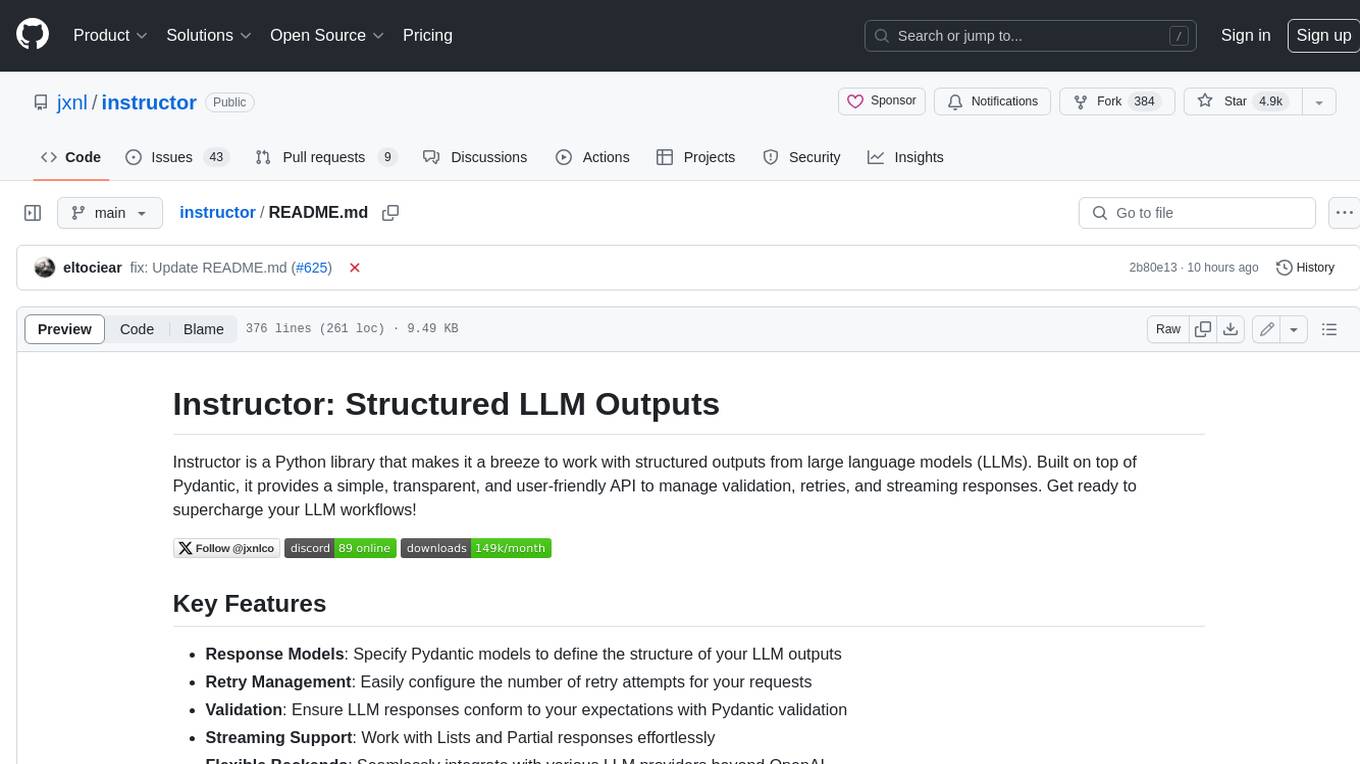
instructor
Instructor is a Python library that makes it a breeze to work with structured outputs from large language models (LLMs). Built on top of Pydantic, it provides a simple, transparent, and user-friendly API to manage validation, retries, and streaming responses. Get ready to supercharge your LLM workflows!
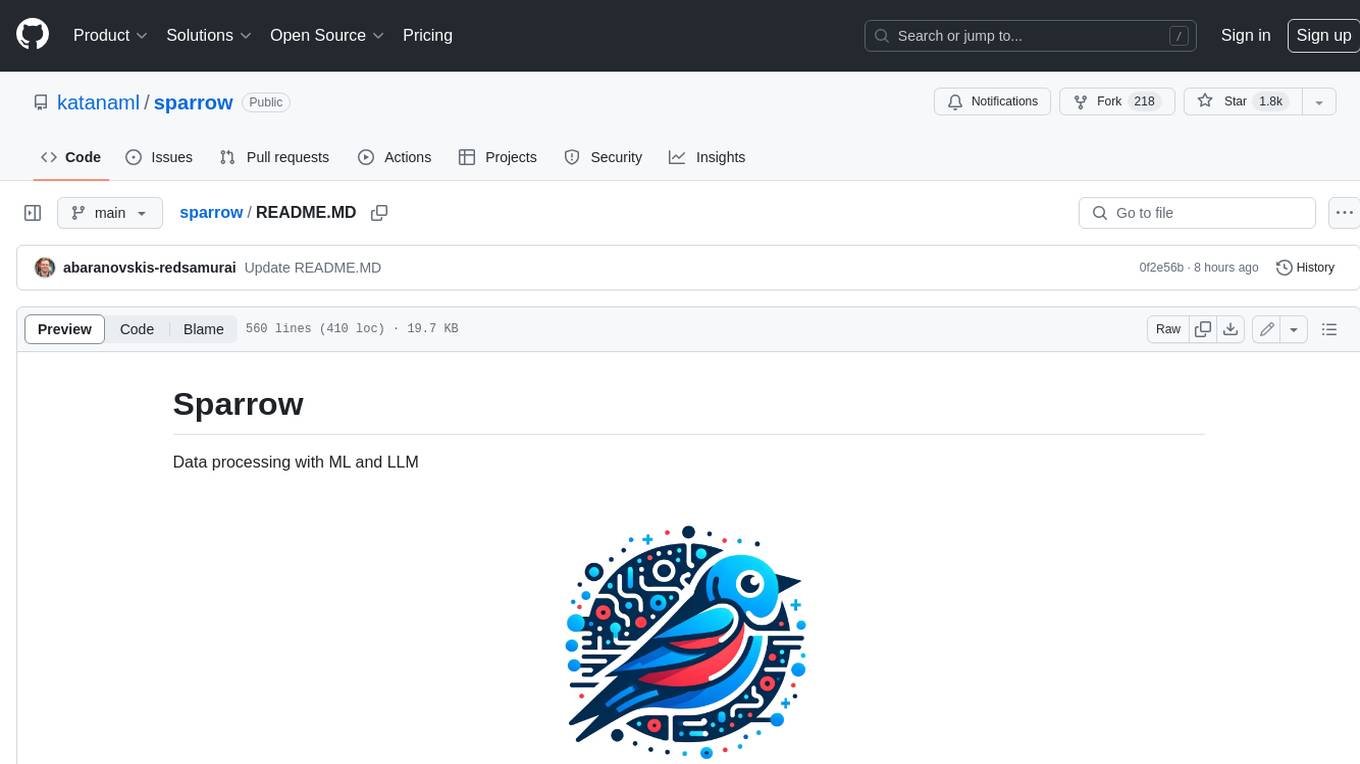
sparrow
Sparrow is an innovative open-source solution for efficient data extraction and processing from various documents and images. It seamlessly handles forms, invoices, receipts, and other unstructured data sources. Sparrow stands out with its modular architecture, offering independent services and pipelines all optimized for robust performance. One of the critical functionalities of Sparrow - pluggable architecture. You can easily integrate and run data extraction pipelines using tools and frameworks like LlamaIndex, Haystack, or Unstructured. Sparrow enables local LLM data extraction pipelines through Ollama or Apple MLX. With Sparrow solution you get API, which helps to process and transform your data into structured output, ready to be integrated with custom workflows. Sparrow Agents - with Sparrow you can build independent LLM agents, and use API to invoke them from your system. **List of available agents:** * **llamaindex** - RAG pipeline with LlamaIndex for PDF processing * **vllamaindex** - RAG pipeline with LLamaIndex multimodal for image processing * **vprocessor** - RAG pipeline with OCR and LlamaIndex for image processing * **haystack** - RAG pipeline with Haystack for PDF processing * **fcall** - Function call pipeline * **unstructured-light** - RAG pipeline with Unstructured and LangChain, supports PDF and image processing * **unstructured** - RAG pipeline with Weaviate vector DB query, Unstructured and LangChain, supports PDF and image processing * **instructor** - RAG pipeline with Unstructured and Instructor libraries, supports PDF and image processing. Works great for JSON response generation
For similar jobs

sweep
Sweep is an AI junior developer that turns bugs and feature requests into code changes. It automatically handles developer experience improvements like adding type hints and improving test coverage.

teams-ai
The Teams AI Library is a software development kit (SDK) that helps developers create bots that can interact with Teams and Microsoft 365 applications. It is built on top of the Bot Framework SDK and simplifies the process of developing bots that interact with Teams' artificial intelligence capabilities. The SDK is available for JavaScript/TypeScript, .NET, and Python.

ai-guide
This guide is dedicated to Large Language Models (LLMs) that you can run on your home computer. It assumes your PC is a lower-end, non-gaming setup.

classifai
Supercharge WordPress Content Workflows and Engagement with Artificial Intelligence. Tap into leading cloud-based services like OpenAI, Microsoft Azure AI, Google Gemini and IBM Watson to augment your WordPress-powered websites. Publish content faster while improving SEO performance and increasing audience engagement. ClassifAI integrates Artificial Intelligence and Machine Learning technologies to lighten your workload and eliminate tedious tasks, giving you more time to create original content that matters.

chatbot-ui
Chatbot UI is an open-source AI chat app that allows users to create and deploy their own AI chatbots. It is easy to use and can be customized to fit any need. Chatbot UI is perfect for businesses, developers, and anyone who wants to create a chatbot.

BricksLLM
BricksLLM is a cloud native AI gateway written in Go. Currently, it provides native support for OpenAI, Anthropic, Azure OpenAI and vLLM. BricksLLM aims to provide enterprise level infrastructure that can power any LLM production use cases. Here are some use cases for BricksLLM: * Set LLM usage limits for users on different pricing tiers * Track LLM usage on a per user and per organization basis * Block or redact requests containing PIIs * Improve LLM reliability with failovers, retries and caching * Distribute API keys with rate limits and cost limits for internal development/production use cases * Distribute API keys with rate limits and cost limits for students

uAgents
uAgents is a Python library developed by Fetch.ai that allows for the creation of autonomous AI agents. These agents can perform various tasks on a schedule or take action on various events. uAgents are easy to create and manage, and they are connected to a fast-growing network of other uAgents. They are also secure, with cryptographically secured messages and wallets.

griptape
Griptape is a modular Python framework for building AI-powered applications that securely connect to your enterprise data and APIs. It offers developers the ability to maintain control and flexibility at every step. Griptape's core components include Structures (Agents, Pipelines, and Workflows), Tasks, Tools, Memory (Conversation Memory, Task Memory, and Meta Memory), Drivers (Prompt and Embedding Drivers, Vector Store Drivers, Image Generation Drivers, Image Query Drivers, SQL Drivers, Web Scraper Drivers, and Conversation Memory Drivers), Engines (Query Engines, Extraction Engines, Summary Engines, Image Generation Engines, and Image Query Engines), and additional components (Rulesets, Loaders, Artifacts, Chunkers, and Tokenizers). Griptape enables developers to create AI-powered applications with ease and efficiency.



